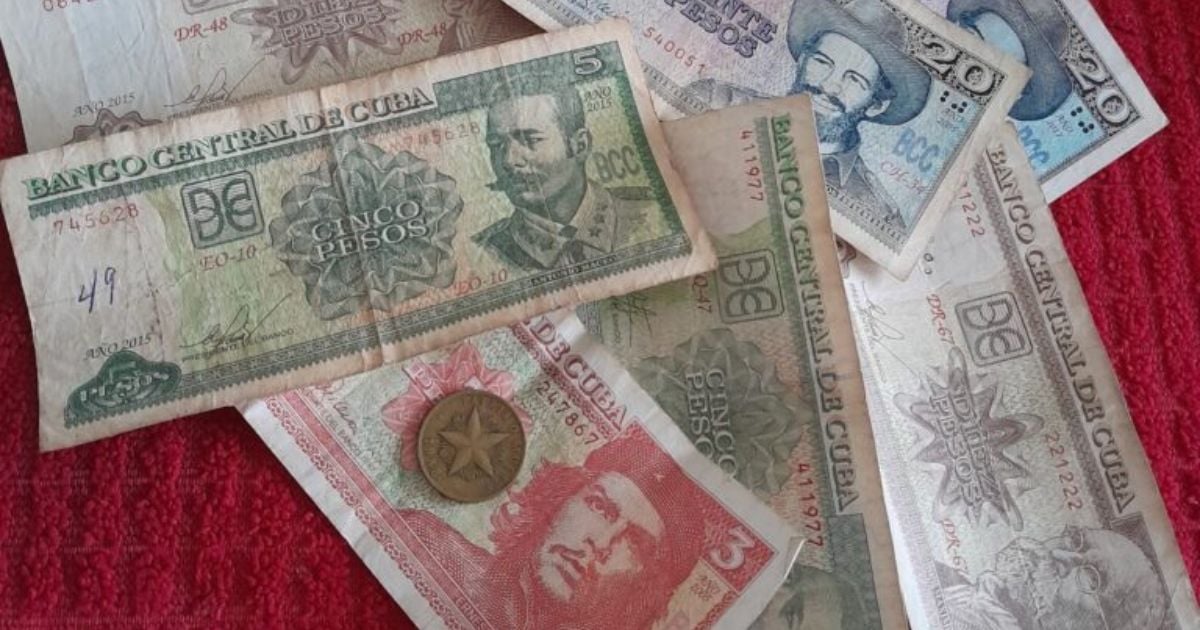
Related videos:
The refusal of small and medium-sized businesses to accept low-denomination bills has become an increasingly common practice in Cuba, creating serious difficulties for a population already suffering from the economic crisis, in addition to the issues stemming from the enforced banking system and the shortage of cash in banks and ATMs.
According to an article published in Bohemia by journalist Irene Izquierdo, this situation primarily impacts those who rely on salaries and pensions to survive.
The Metropolitan Bank, one of the leading financial institutions in Havana, mainly issues bills of 20, 10, and 5 pesos, which many businesses are now refusing to accept.
A clear example of this issue is the case of Norma Redonovich, a retiree with a monthly pension of 1,600 pesos, who spent three months saving money to provide her daughter with a special lunch for her birthday.
Upon visiting the small business "El Moro," one of the most well-known establishments in Alamar for its slightly more affordable prices, he encountered a notice stating that no more than 300 pesos in 20 and 10 peso bills would be accepted.
The situation took a tense turn when Redonovich tried to pay for a can of milk that cost 430 pesos, not including the price of the chicken.
"Several people in line showed their support and helped me exchange the money for 50 and 100 peso bills," recounted the affected individual.
The experience sparked a heated debate among those present, who began to share their own difficulties with businesses that only accept 100 peso bills or higher.
"And what is the purpose of banking?" asked one of those present, referring to the unfulfilled promises of the electronic payment system.
The basic principle of banking is to facilitate transactions and reduce the use of cash, which is quite distant from the reality in Cuba, where physical transactions still prevail and are exacerbated by a lack of available cash.
During the debate, it was mentioned that some businesses justify this practice because their wholesale suppliers also refuse small bills when selling merchandise.
However, others questioned whether this trend conceals an attempt to evade tax oversight, a recurring issue in the country due to the shortage of inspectors and the lack of transparency in tax declarations.
The article also pointed out that cash transactions increase the risks of tax evasion in an economic context that still requires more efficient control mechanisms.
At the same time, digital transactions, which should address these issues, are not fully implemented or accessible to all segments of the population.
As Izquierdo pointed out, the accumulation of small bills in the hands of the population contrasts with their discrimination in business transactions, where often the difference between denominations exists only physically, as in essence, all money is the same.
This situation reflects the complexity of an economy marked by inflation, cash shortages, and the difficulties associated with enforced banking. Ultimately, this impacts the most vulnerable populations the most.
Frequently asked questions about the cash crisis and economic issues in Cuba
Why do businesses in Cuba refuse low-denomination bills?
Businesses in Cuba refuse low-denomination bills because their wholesale suppliers also reject them when selling goods. Furthermore, this practice may conceal attempts to evade tax regulations, as handling cash increases the risks of tax evasion.
How does the refusal to accept small bills affect the Cuban population?
The refusal to accept small bills seriously impacts the population, especially those who rely on salaries and pensions. This is because the Metropolitan Bank predominantly issues low-denomination bills, complicating everyday transactions and creating tension when purchasing essential goods.
What is banking and why hasn't it worked in Cuba?
Banking is a system aimed at facilitating financial transactions and reducing the use of cash. In Cuba, banking has not been successful due to the incomplete implementation of digital transactions, a shortage of cash, and resistance from certain sectors to adopt this measure, which exacerbates the economic situation for many Cubans.
What alternatives do Cubans have in the face of cash shortages and the refusal to accept small bills?
Due to the cash shortage and the refusal to accept small bills, Cubans often have to resort to exchanging money with others to obtain larger denominations. The government has suggested utilizing the "Caja Extra" service at state-run stores, but many of these establishments are not equipped to offer this service, which restricts the options available to the population.
Filed under: